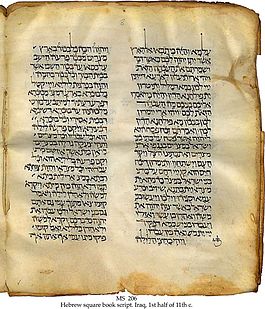Hebrew Bible
| Part of a series on | |||
|---|---|---|---|
| |||
| Judaism | |||
| Category | |||
| Jewish religious movements | |||
| Jewish philosophy | |||
| Religious texts | |||
| Religious Law | |||
|
Kashrut • Tzniut • Tzedakah • Niddah • Noahide laws | |||
| Holy cities | |||
| Important figures | |||
| Rabbinic sages | |||
| Jewish life cycle | |||
| Religious roles | |||
|
Rabbi • Rebbe • Posek • Hazzan/Cantor | |||
|
Dayan • Rosh yeshiva • Mohel • Kohen/Priest | |||
| Religious buildings & institutions | |||
| Jewish education | |||
| Religious articles | |||
|
Sefer Torah • Tallit • Tefillin • Tzitzit • Kippah | |||
| Jewish prayers and services | |||
| Judaism & other religions | |||
| Abrahamic faiths | |||
| Related topics | |||

The Hebrew Bible, which is also called the Tanakh is the Biblical canon of Hebrew scriptures, including the Torah, Nevi'im and Ketuvim. These texts are almost exclusively in Hebrew, with a few passages in Aramaic.
It means the same as the Jewish Tanakh and the Protestant Old Testament, but does not include the deuterocanonical portions of the Roman Catholic Old Testament and is meant for the text only, not for naming, numbering or ordering of books (what both Tanakh and Old Testament do).
The "Tawrat" (Arabic: توراة) is the Arabic name for the Torah within its context as an Islamic holy book believed by Muslims to be given by God (Allah) to prophets and messengers amongst the Children of Israel, and often refers to the entire Hebrew Bible.[1]
Usage
[change | change source]On the one hand, the term "Hebrew Bible" is not often used among adherents of either Judaism or Christianity. On the other hand, it is widely used in academic writing and interfaith discussion.
Written versions
[change | change source]In Judaism, the version used today is the Masoretic Text. It was put together between the 6th and 10th centuries. Another version is the Septuagint, which was translated from Hebrew into Greek. The Septuagint was started between the 3rd and 1st centuries BCE.
References
[change | change source]- ↑ Isabel Lang Intertextualität als hermeneutischer Zugang zur Auslegung des Korans: Eine Betrachtung am Beispiel der Verwendung von Israiliyyat in der Rezeption der Davidserzählung in Sure 38: 21-25 Logos Verlag Berlin GmbH, 31.12.2015 ISBN 9783832541514 p. 98 (German)
Further reading
[change | change source]- Johnson, Paul (1987). A History of the Jews (First, hardback ed.). London: Weidenfeld and Nicolson. ISBN 0-297-79091-9.
- Kuntz, John Kenneth. The People of Ancient Israel: an introduction to Old Testament Literature, History, and Thought, Harper and Row, 1974. ISBN 0-06-043822-3
- Nothing old about it by Shmuley Boteach (Jerusalem Post, November 28, 2007).
Other websites
[change | change source]- A Hebrew Bible from around the year 1300


